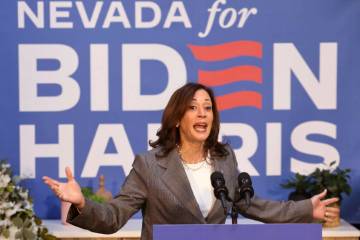Limited liability companies get bad rap
In 1991, then-Secretary of State Cheryl Lau urged lawmakers to make Nevada more business-friendly by passing legislation that recognized a hybrid corporate entity: the limited liability company.
LLCs, as they are called, combine the tax advantages of partnerships and the limited liability of corporations.
Lau reasoned that creating that option by statute would encourage more people in and outside the state to launch businesses in Nevada.
The main selling points? LLCs would diversify the economy; filing fees would boost the state's revenues.
Legislators overwhelmingly agreed. They got something on the books the same year.
Few states then recognized LLCs. Today, they all do.
Yet somewhere along the way, Nevada became one of a handful of states to gain a national reputation of providing fertile corporate ground for tax evaders and other scam artists. LLCs, with their renowned veil of secrecy, are largely blamed for that perception.
In fact, they have morphed into the symbol for all that is wrong with minimal disclosure rules, despite the fact that corporations statewide are held to roughly the same standard as LLCs.
What's the biggest gripe about them in Nevada?
"It's the complete failure to keep track of who owns LLCs," says Jack Blum, a Washington, D.C., attorney and Internal Revenue Service consultant who specializes in financial crime cases, including money laundering and offshore tax evasion.
In many instances, he says, "Nobody will ever figure out who is behind them."
Like most states, Nevada doesn't require the names of owners when an LLC is formed.
But, Blum points out, that information eventually emerges -- or at least is easier to ferret out -- in other states when companies comply with subsequent reporting requirements.
The managers or members listed in annual LLC filings to Nevada's secretary of state aren't necessarily the owners.
While the same holds true in other states, most states, unlike Nevada, have taxing authorities that may require owner information. And that provides a paper trail.
In Nevada, the lack of one impedes criminal investigations, a Las Vegas detective says. He faults the lag time of up to two months from the date an LLC organizes and the date its initial list of managers or managing members is due. Sometimes the list never materializes and the state is forced to revoke the company's charter, called articles of organization for domestic LLCs and registration for foreign ones.
But by then, the damage has already been done.
"By the time I get assigned to it, there are no (corporate) officers listed that I can specifically grab ahold of," says Pete Dustin, a detective in the Metropolitan Police Department's financial crimes unit.
"We just run out of time. Our starting point is to look for ownership."
One LLC law expert says the state's perceived problems stem not from its laws, which are similar to those of other states, but from its legal enticements to form LLCs.
Even the secretary of state's office touts on its Web site the fact that Nevada has no corporate income tax, state income tax or franchise tax.
"In truth, whatever reputation Nevada might enjoy -- for good or for ill -- would be for reasons other than its LLC statute," says Robert Lawless, a former University of Nevada, Las Vegas political science professor now teaching at the University of Illinois College of Law at Urbana-Champaign.
"Of course, California and many other states will see Nevada as a tax haven for the simple reason that it is. ... Allegations of tax evasion or money laundering may or may not be justified, but the LLC form is simply the form in which these activities occur. If there are any problems, the LLC is the manifestation of them, not the root cause."
Nevada corporations enjoy the same tax advantages that LLCs do. And their disclosure rules are similar.
Like LLCs, corporations are not required to reveal their owners. Corporations must name their directors and officers, much like LLCs must name their members or managers.
Additionally, corporations must report the value of the number of authorized shares they issue. Their filing fees are based on it.
LLCs don't have shares. They have membership interest, which they don't have to report.
Nevada's LLC statutes have been revised throughout the years. But it sometimes takes a major scandal to make glaringly clear just how easily owners can hide behind company structures.
In 2005, a bill requiring more disclosure was signed into law after newspaper reports revealed that several LLCs reaped millions of dollars by flipping publicly owned parcels through land swaps with McCarran International Airport.
Land broker Scott Gragson, grandson of a late former Las Vegas mayor, controlled the companies that profited from the deals.
Nothing came of local and federal investigations. In early 2007, the Nevada Real Estate Division found insufficient evidence of misconduct on the part of Tim Morse, who appraised all the airport properties sold or traded to Gragson.
The 2005 law requires state, city and county governments to sell most of their surplus public land at auction, except in special cases. Furthermore, it requires disclosing the identity of anyone owning at least 1 percent of an LLC involved with local or state government in a land sale, lease, or transfer.
But Derek Rowley, head of the Nevada Registered Agent Association, said those kinds of activities, criminal or not, could have just as easily involved a corporation or land trust.
"Criminals use the same tools that legitimate business people do to conduct legitimate activity," Rowley says.
There's no demonstrable evidence that LLCs have diversified Nevada's economy in the nearly 20 years since they were established. About 80 percent are foreign, meaning they are organized under the laws of other states but are allowed to do business in the Silver State.
"They have taken the protection of Nevada LLCs, and they haven't moved here," says Somer Hollingsworth, president and chief executive of the Nevada Development Authority.
They do contribute to the state's coffers, however.
In the last year alone, LLC filings generated $19.94 million. The bulk, $16.6 million, came from annual fees paid by companies in and outside Nevada.
In 2006, the number of new filings for LLCs for the first time outpaced those for corporations.
"LLCs are, or have become, the entity of choice," says Scott Anderson, deputy secretary of state for commercial recordings.
For many business owners, LLCs offer the best of both worlds. Their personal assets, like those of corporate shareholders, are generally protected from business debts and claims. Other LLC features resemble those of a partnership: management flexibility and what is called pass-through taxation.
The LLC itself is not a taxable entity, so LLC members pay taxes only once on their share of the company's profits, when they file their personal income tax returns.
In contrast, corporations have a form of double taxation: They pay taxes on profits when they file their federal income tax returns, and their shareholders must claim their dividends as income.
In 1977, Wyoming became the first state to pass an LLC statute. Although that action garnered little attention at the time, it ultimately led to a new era in business formations. So says Larry Ribstein, another University of Illinois law professor, in a report on the history of LLCs in the United States, published in late 2003 by the American Bar Association.
The IRS initially vacillated on how to classify this new entity for tax purposes. After ruling in 1988 that LLCs could be taxed as partnerships, the agency in 1997 began allowing them to decide whether they wanted to be taxed as partnerships or corporations.
Ribstein says that "check-the-box" ruling tore the lid off LLC growth. By the end of 2005, nearly 4.9 million LLCs were active or in good standing nationwide, says the International Association of Commercial Administrators, a group that solicits annual reporting from states.
Nevada entered the LLC arena well before then.
The spring of 1991 found the state Senate and Assembly judiciary committees poring over Assembly Bill 655. The proposed legislation created the option of LLCs within a broad framework of revamping existing law governing corporations and other organizations, including nonprofits.
Lau, the former secretary of state now running as a Republican candidate for Northern Nevada's Assembly District 40 seat, says she didn't anticipate that the state's LLCs over time would become viewed as models for deception.
It may be the case of a few bad apples, she says. She has no regrets.
"I don't think it has backfired on us," Lau says.
"What we envisioned when we introduced the LLCs is bringing that particular vehicle to Nevada for a business-friendly climate. I envisioned that there would be entities -- a minority that may find loopholes, ways to get away with maybe violating our statutes -- but I felt that as we encountered those experiences, that we could close down loopholes and refine our statutes."
One such loophole closed last year with passage of Assembly Bill 80. Now law, it requires LLCs to disclose names, addresses and phone numbers of their members when making political campaign contributions.
Outgoing state Senate Minority Leader Dina Titus, D-Las Vegas, favored a tougher bill that mirrored the level of disclosure specified in the 2005 law regarding land transfers. She said then that LLCs were increasingly abusing the anonymity that the laws provided.
A person could set up several LLCs one day and have each contribute the $10,000 limit set for individuals, thereby legally exceeding the limit.
Titus, who is running for Congress, voted for the LLC statute in 1991, but says she realized over time that LLC laws could be exploited in many ways.
"I still support the notion of LLCs but think they need more transparency, in terms of general business practices and especially in campaign contribution practices," she says.
Titus doesn't expect all legislators to readily agree, however.
"Our whole philosophy in Nevada is that less regulation is better," Titus says. "I'm sure that part of the argument would be that we will lose revenue for the state if you tighten up provisions of limiting LLCs."
In the fiscal year ending June 30, LLC filings generated about $20.5 million, or nearly 25 percent of the $82.8 million paid by all business entities to the state's commercial filing division.
Nevada has approximately 138,000 LLCs, including 43,912 that formed last year. They account for about 43 percent of all business entities on file with the state, up slightly from the previous fiscal year.
A broad range of businesses can form LLCs. Except in certain circumstances, Nevada excludes those that specialize in accounting, auditing, banking, insurance and engineering.
Developers like using them for real estate transactions or projects.
In Nevada, an LLC can consist of just one person. He need only pay $75 -- more for expedited service -- and provide the company name and the names and addresses of members or managing members and a registered agent.
Slightly more is known about foreign LLCs. They must say in what other state their companies are formed.
But other states require even less disclosure, notes Anderson, the state's deputy secretary for commercial recordings. "It's not a Nevada issue, so to speak. It's an LLC issue."
Contributing to their ill repute are "shell companies," which exist only on paper. They have no physical presence except for a mailing address, employ no workers and produce nothing.
Shell companies are formed for legitimate and illegitimate purposes.
Domestic shell companies, both LLCs and other business entities, are used for credit card schemes, fraudulent loans and international wire transfers that could be used to launder money and even finance terrorism, according to a 2006 report by the U.S. Department of Treasury's Financial Crimes Enforcement Network, or FinCEN.
"The LLC, particularly when organized in a state which does not require reporting of information on ownership, provides an attractive vehicle for a shell company because it can be owned or managed anonymously and is inherently vulnerable to abuse."
The report, "The Role of Domestic Shell Companies in Financial Crime and Money Laundering: Limited Liability Companies," describes the Silver State, Oregon, Wyoming and Delaware as being particularly appealing to shell companies.
Among the four, Delaware offers the least transparency.
Some states require ownership information on LLC filings, but none require reporting of the "beneficial owners," or actual company owners. In fact, a person can own an LLC indirectly, through nominees and other business entities.
Fourteen states don't require such companies to identify their members or managers. Eight states and the District of Columbia require LLCs to report the identities only of managers.
Nevada is among the 24 that require LLCs to identify their members, but only when the companies lack managers.
Blum, the attorney specializing in international financial crimes, says states competing to offer the least disclosure are in "a race to the bottom."
"If the state is going to give people the privilege of limited liability, why shouldn't people know who is behind a company?" he asks. "What is the benefit of anonymity, other than scamming somebody?"
Protecting oneself from frivolous lawsuits and identity theft, answers Rowley, who heads the Nevada Registered Agent Association.
"Some people just want privacy because it is just prudent in today's society not to have everything about your life out there on the Internet."
If the growth rate of new LLCs is any guide, the FinCEN report says, there appears to be no definitive correlation between a state's level of transparency and the preference to form an LLC there.
Nevada had the 12th highest percentage increase in new LLCs formed from 2001 to 2005. Heading the list were Florida, Delaware, California, Texas and New York.
Although the report focuses on LLCs, it notes that other business entities, including trusts and corporations, also are vulnerable to abuse.
Dustin, the Las Vegas detective, says people who commit mortgage fraud on properties nearing foreclosure have switched from using "street trusts" to "street LLCs." These companies are named after property addresses.
"That is the newest scheme on how to use other people's money," he says. "It's a means to hide assets and/or steal."
Scammers prey on homeowners struggling to make mortgage payments. They offer to buy the home, obtain a quit-claim deed and transfer control of the home to an LLC.
The owners move out and renters move in. But the new residents soon face eviction because their rent checks never reach the lender holding the note.
Meanwhile, the person whose name remains on the mortgage gets swindled out of equity accrued in the home.
At that point, Dustin says, there is no paper trail other than the LLC filing bearing the name of a registered agent.
That is why, for him, street LLCs raise a red flag.
"That's automatic that the individual on the note no longer has control of the property," Dustin says. "That means somebody else is playing with it. Theoretically, there may be equity skimming going on, or an outright rip."
Proposed federal legislation, called the Incorporation Transparency and Law Enforcement Assistance Act, could significantly level the playing field for LLCs.
Introduced in May by Sens. Barack Obama of Illinois, Carl Levin of Michigan and Norm Coleman of Minnesota, the bill requires secretaries of state to maintain ownership records of private corporations and LLCs.
Although states could keep the owners' names confidential from the public, state officials would be required to provide the records in response to a law enforcement agency's subpoena or summons.
Anderson says Nevada has had something like that on its books since last year. Among other things, the new law says authorities can request ownership records from corporations and LLCs. If the company fails to respond, the secretary of state's office can revoke its charter, he says.
"Many of the provisions in our bill, in our statute, are very similar to the federal bill."
In late 2006, Anderson told a Senate homeland security committee that Nevada gets up to 35 requests monthly from law enforcement and other agencies for company records. They never ask who the beneficial owners are.
"This statute has been in effect since 2007, yet we have not had one request from law enforcement to request that," he says. "At the time, there seemed to be a real sense of urgency, yet we have not seen any action on this."
Blum, the legal expert on international financial crimes, remains unimpressed by Nevada's latest move to hold LLCs more accountable.
"Big deal. We don't know who owns them, but we will revoke their charter. How will you shut down the bank accounts if the business is conducting in some other location?... How do you find out who is behind what?"
Contact Margaret Ann Miille at mmiille @reviewjournal.com or 702-383-0401.






























